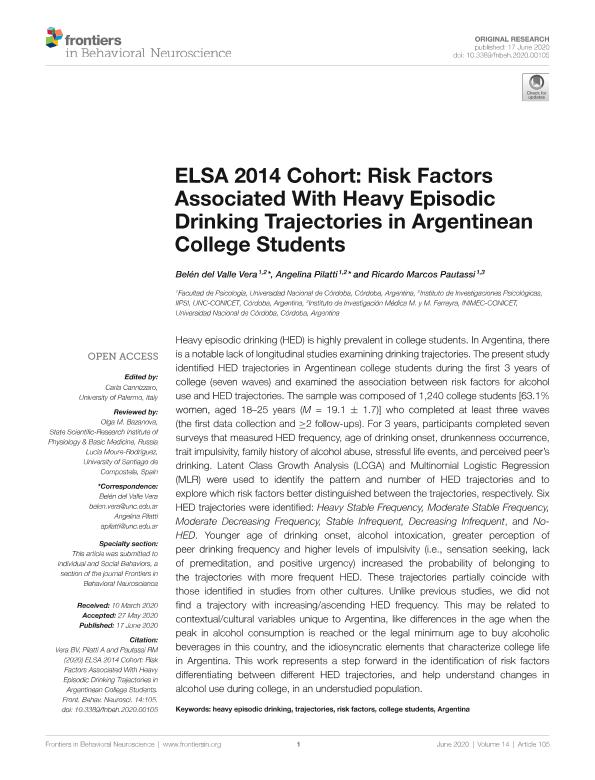Mostrar el registro sencillo del ítem
dc.contributor.author
Vera, Belén del Valle

dc.contributor.author
Pilatti, Angelina

dc.contributor.author
Pautassi, Ricardo Marcos

dc.date.available
2021-11-08T11:11:45Z
dc.date.issued
2020-06-17
dc.identifier.citation
Vera, Belén del Valle; Pilatti, Angelina; Pautassi, Ricardo Marcos; ELSA 2014 Cohort: Risk Factors Associated With Heavy Episodic Drinking Trajectories in Argentinean College Students; Frontiers Media; Frontiers in Behavioral Neuroscience; 14; 17-6-2020; 1-11
dc.identifier.issn
1662-5153
dc.identifier.uri
http://hdl.handle.net/11336/146211
dc.description.abstract
Heavy episodic drinking (HED) is highly prevalent in college students. In Argentina, there is a notable lack of longitudinal studies examining drinking trajectories. The present study identified HED trajectories in Argentinean college students during the first 3 years of college (seven waves) and examined the association between risk factors for alcohol use and HED trajectories. The sample was composed of 1,240 college students [63.1% women, aged 18–25 years (M = 19.1 ± 1.7)] who completed at least three waves (the first data collection and ≥2 follow-ups). For 3 years, participants completed seven surveys that measured HED frequency, age of drinking onset, drunkenness occurrence, trait impulsivity, family history of alcohol abuse, stressful life events, and perceived peer’s drinking. Latent Class Growth Analysis (LCGA) and Multinomial Logistic Regression (MLR) were used to identify the pattern and number of HED trajectories and to explore which risk factors better distinguished between the trajectories, respectively. Six HED trajectories were identified: Heavy Stable Frequency, Moderate Stable Frequency, Moderate Decreasing Frequency, Stable Infrequent, Decreasing Infrequent, and No-HED. Younger age of drinking onset, alcohol intoxication, greater perception of peer drinking frequency and higher levels of impulsivity (i.e., sensation seeking, lack of premeditation, and positive urgency) increased the probability of belonging to the trajectories with more frequent HED. These trajectories partially coincide with those identified in studies from other cultures. Unlike previous studies, we did not find a trajectory with increasing/ascending HED frequency. This may be related to contextual/cultural variables unique to Argentina, like differences in the age when the peak in alcohol consumption is reached or the legal minimum age to buy alcoholic beverages in this country, and the idiosyncratic elements that characterize college life in Argentina. This work represents a step forward in the identification of risk factors differentiating between different HED trajectories, and help understand changes in alcohol use during college, in an understudied population.
dc.format
application/pdf
dc.language.iso
eng
dc.publisher
Frontiers Media

dc.rights
info:eu-repo/semantics/openAccess
dc.rights.uri
https://creativecommons.org/licenses/by/2.5/ar/
dc.subject
ARGENTINA
dc.subject
COLLEGE STUDENTS
dc.subject
HEAVY EPISODIC DRINKING
dc.subject
RISK FACTORS
dc.subject
TRAJECTORIES
dc.subject.classification
Otras Psicología

dc.subject.classification
Psicología

dc.subject.classification
CIENCIAS SOCIALES

dc.title
ELSA 2014 Cohort: Risk Factors Associated With Heavy Episodic Drinking Trajectories in Argentinean College Students
dc.type
info:eu-repo/semantics/article
dc.type
info:ar-repo/semantics/artículo
dc.type
info:eu-repo/semantics/publishedVersion
dc.date.updated
2021-09-27T15:18:01Z
dc.journal.volume
14
dc.journal.pagination
1-11
dc.journal.pais
Suiza

dc.journal.ciudad
Lausanne
dc.description.fil
Fil: Vera, Belén del Valle. Universidad Nacional de Córdoba. Instituto de Investigaciones Psicológicas. - Consejo Nacional de Investigaciones Científicas y Técnicas. Centro Científico Tecnológico Conicet - Córdoba. Instituto de Investigaciones Psicológicas; Argentina. Universidad Nacional de Córdoba. Facultad de Psicología; Argentina
dc.description.fil
Fil: Pilatti, Angelina. Universidad Nacional de Córdoba. Instituto de Investigaciones Psicológicas. - Consejo Nacional de Investigaciones Científicas y Técnicas. Centro Científico Tecnológico Conicet - Córdoba. Instituto de Investigaciones Psicológicas; Argentina. Universidad Nacional de Córdoba. Facultad de Psicología; Argentina
dc.description.fil
Fil: Pautassi, Ricardo Marcos. Universidad Nacional de Córdoba. Facultad de Psicología; Argentina. Consejo Nacional de Investigaciones Científicas y Técnicas. Centro Científico Tecnológico Conicet - Córdoba. Instituto de Investigación Médica Mercedes y Martín Ferreyra. Universidad Nacional de Córdoba. Instituto de Investigación Médica Mercedes y Martín Ferreyra; Argentina
dc.journal.title
Frontiers in Behavioral Neuroscience
dc.relation.alternativeid
info:eu-repo/semantics/altIdentifier/url/https://www.frontiersin.org/article/10.3389/fnbeh.2020.00105/full
dc.relation.alternativeid
info:eu-repo/semantics/altIdentifier/doi/http://dx.doi.org/10.3389/fnbeh.2020.00105
Archivos asociados
